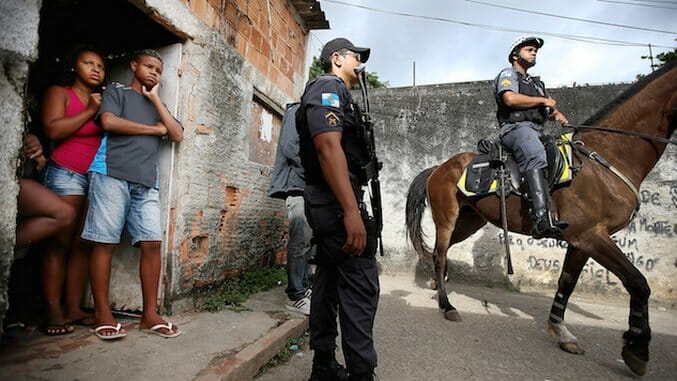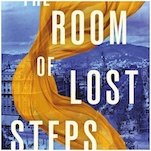Human Rights Groups Highlight Killings By Police Ahead of Rio Olympics
Photos by Mario Tama/Getty Images
Jonathan de Oliveira Lima had just dropped off a dessert at his grandmother’s home when he was shot in the back and killed by military police. It was less than four weeks before the World Cup began in Brazil in June 2014, and security in Manguinhos, a favela in Rio de Janeiro’s north zone the 19-year-old called home, had tightened considerably. He was one of 580 civilians killed by police in Rio in 2014—a 40 percent increase from the previous year.
Last week, Jonathan’s mother, Ana Paula Oliveira, met with International Olympic Committee officials in Switzerland to implore the organization to monitor human rights abuses in Rio during the upcoming Olympic Games. She fears the expanded security presence in the city will contribute to more police-involved killings in a city with few legal recourses for low-income residents.
Her concerns were reflected in a new report by Amnesty International condemning the forced evictions, police violence and restrictions of civil liberties pervasive in Rio as the city has readied itself for the Olympics. The report claims the city’s previous experiences hosting mega-events and its history of police violence indicate that the upcoming Games could lead to an increase in human rights abuses, particularly among low-income residents of Rio’s 1000 favelas.
Police-involved shootings are notoriously underreported in Brazil, but recent research indicates a particularly dire situation in Rio. Human Rights Watch reports that 645 people were killed by police in 2015, accounting one fifth of homicides in the city. The study also found that police frequently alter crime scenes, planting guns or removing bodies entirely. The Rio-based Instituto de Segurança Pública (ISP) reported last month that 40 people were killed by police in the month in May, a 135 percent increase compared with the 17 police-involved killings in May 2015. The uptick prompted the United Nations to issue an official statement of concern regarding police-inflicted violence.
“The soaring death count ahead of this major sporting event represents an epic failure on the part of the authorities to protect the most fundamental human right—the right to life,” said Atila Roque, Executive Director of Amnesty International Brazil.
Security preparations currently present one of the most pressing challenges ahead of the Olympics. Authorities have promised to deploy 85,000 armed soldiers and police officers to guard stadiums, athletic facilities and popular tourist districts in what will be the largest security operation in Brazilian history. These forces do not include the thousands of military police officers currently occupying Rio favelas through the city’s “pacification” program.
-

-

-

-

-

-

-

-

-

-

-

-

-

-

-

-

-

-

-

-

-

-

-

-

-

-

-

-

-

-

-

-

-

-

-

-

-

-

-

-










































